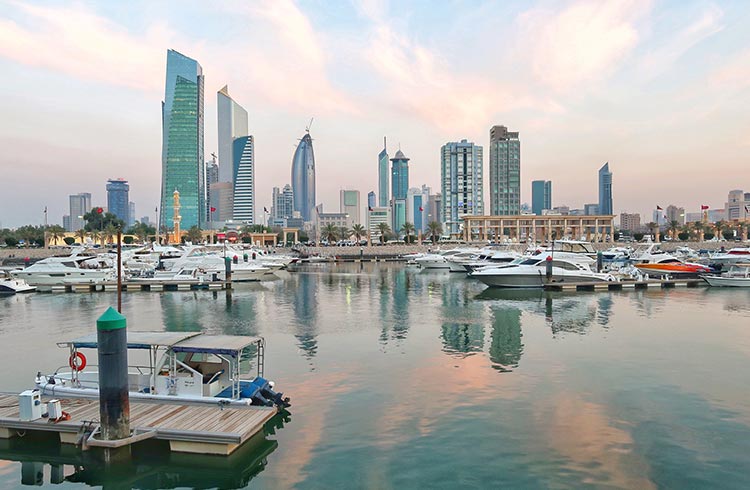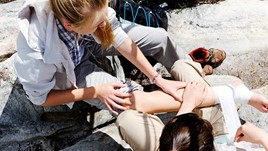Is Kuwait Safe for Travelers? 5 Things You Should Know
Kuwait is a safe place for most travelers to the Arabian Gulf, but here are a few tips on respecting local laws and culture.
 Photo © Getty Images/Shahbaz Hussain's Photos
Photo © Getty Images/Shahbaz Hussain's Photos
- Terrorism risk and civil unrest in Kuwait
- Crime in Kuwait
- Getting around Kuwait
- Health hazards in Kuwait
- Local laws and etiquette
Terrorism risk and civil unrest in Kuwait
Wealthy, safe and just about crime-free, Kuwait is a great entry point to the Muslim world of souks, mosques and that all-important warm Arabian hospitality.
Check your government travel advisory before you go. Many governments advise traveling with a high degree of caution in Kuwait.
It's not all blue skies and sunshine in the Middle East, but it's worth noting that there has been only one incidence of terrorism in Kuwait since 2005.
Foreigners have only been the target of terrorism once going back to an attack carried out on the US Embassy by non-Kuwaitis during the first Gulf War. However, more recently in June 2015, 27 people were killed including non-Kuwaitis and 227 injured in a terrorist attack during Friday prayers on a mosque in Kuwait during Ramadan.
In 2011, there were protests by various groups, including Bidoons (or stateless persons); expatriate laborers, as well as anti-government demonstrations by young Kuwaitis. International events and political developments (including elections) may also prompt demonstrations in Kuwait. You should take particular care in the areas of Jahra, Sulaibaya and areas near the border with Iraq.
As you would with any country you travel to, be aware of your surroundings in public places and avoid large gatherings and demonstrations as these can often turn violent.
Crime in Kuwait
Crime levels in Kuwait are very low. The incidence of violent crimes against travelers is negligible. However, you should exercise the same precautions you would at home or in any major city.
Some women travelers have recently been subjected to both physical and verbal harassment. Women should avoid walking alone in isolated areas at night and travel with a companion if possible. Within the past decade, several instances of sexual assault against foreign women in Kuwait City have been reported. Some assaults have reported instigated by a person posing as a police officer.
The Kuwaiti police accept crime reports at the police station with jurisdiction over the area where the crime occurred. If filing a crime report, it is advisable to be accompanied by a person who speaks Arabic or by a local attorney.
Getting around Kuwait
Wiley vehicle patterns and unconventional driving habits encourage tourists to opt-out of renting a car in Kuwait. Hire a driver or get to know a good local taxi driver. While the roads are good in Kuwait, the driving skills and level of respect for road rules may not match those from other countries. However, if you do choose to hire a car, it's important you know what insurance is included and what isn't.
Common sights on Kuwaiti roads:
- Total disregard for any kind of signaling
- Speeding
- Aggressive driving including tail-gaiting and lane weaving
- Disregard for seatbelts and basic safety inside cars
- Talking and texting on a mobile phone while driving
- Running red lights
- Pulling into traffic without looking or indicating
- Driving in an emergency lane or on the hard shoulder to avoid traffic
If involved in a car accident, do not attempt to move your car until the police arrive and have made a report or you will be arrested.
Also, hailing a taxi from the road is not advisable, particularly if you are female. There have been a few incidents of passengers being harassed while doing so. Try to book a taxi in advance and use a reputable taxi company.
Health hazards in Kuwait
Kuwait is developing at such a pace that it can be easy to forget it was part of the Gulf War not all that long ago. However, there are still unexploded munitions, including landmines in many rural areas, at beaches and recreational sites.
People have been injured after picking up metal or plastic objects. Do not stray from well-traveled roads, stay on clearly identifiable tracks, and exercise great care, because there is a danger of unexploded ordnance even if an area has been officially cleared. Do not pick up any strange metal, plastic or other objects lying around or souvenir-hunt for war memorabilia.
In terms of weather and environmental hazards, sand and dust storms occur regularly and flooding is not uncommon. Being a Gulf state Kuwait often experiences extremely high temperatures. During the hottest months of the year, the temperature regularly exceeds 50ºC.
Check with your hotel or local guide before swimming in the sea off Kuwait City. In 2009, one of the main pumping stations in Kuwait City broke down and untreated sewage was released into the sea. While the problem has largely been dealt with, it is still advisable to avoid swimming here if possible.
Litter in the water is also problematic at some beach locations.
Medical facilities vary in terms of the level of care including some facilities not allowing the admission of expatriates and so medical evacuation to another city that has the necessary care and facilities may be required.
Local laws and etiquette
Kuwait is a Muslim country and while not as conservative as many of its Gulf neighbors, you should behave and dress in a respectful way.
Respect local traditions, customs, laws and religions at all times and be aware of your actions to ensure that they do not offend other cultures or religious beliefs, especially during the holy month of Ramadan or if you intend to visit religious areas.
The following are illegal in Kuwait:
- Homosexual acts
- Unmarried heterosexual couples to live together
- Importation and use of alcohol
- Importation and use of pork products
- Pornography
- Drink driving
Further, anyone involved in a commercial or any other dispute with a Kuwaiti company or individual may be prevented from leaving the country or placed in custody, pending resolution of the dispute.
In terms of dress code, Kuwait is fairly relaxed, however, to avoid unnecessary attention women should not wear short skirts, sleeveless shirts or low necklines. Bikinis are fine at the hotel pool, but not on public beaches.
The Emir of Kuwait is venerated. Prison terms of up to seven years can be imposed for challenging the authority of the Emir or insulting him - whether by speech, writing, drawing or any other means of expression.
Taking photographs of or near government buildings or other infrastructure, including oil fields, can lead to detention. It is also forbidden to take photographs at some shopping centers.
Alcohol is totally prohibited in Kuwait. It may not be imported, manufactured or served. Some expat-geared restaurants offer "special" tea, but unlike neighboring states; Bahrain, Qatar and UAE, alcohol cannot be even served at hotels or by permit holders.
So, apart from the ever-present threat of terrorism and "abstract" drivers, Kuwait has to be one of the easiest and safest countries for travel in the Gulf region.
Related articles
Simple and flexible travel insurance
You can buy at home or while traveling, and claim online from anywhere in the world. With 150+ adventure activities covered and 24/7 emergency assistance.
Get a quote

10 Comments